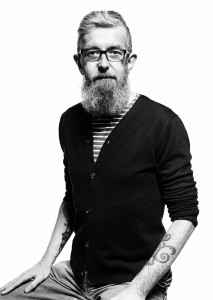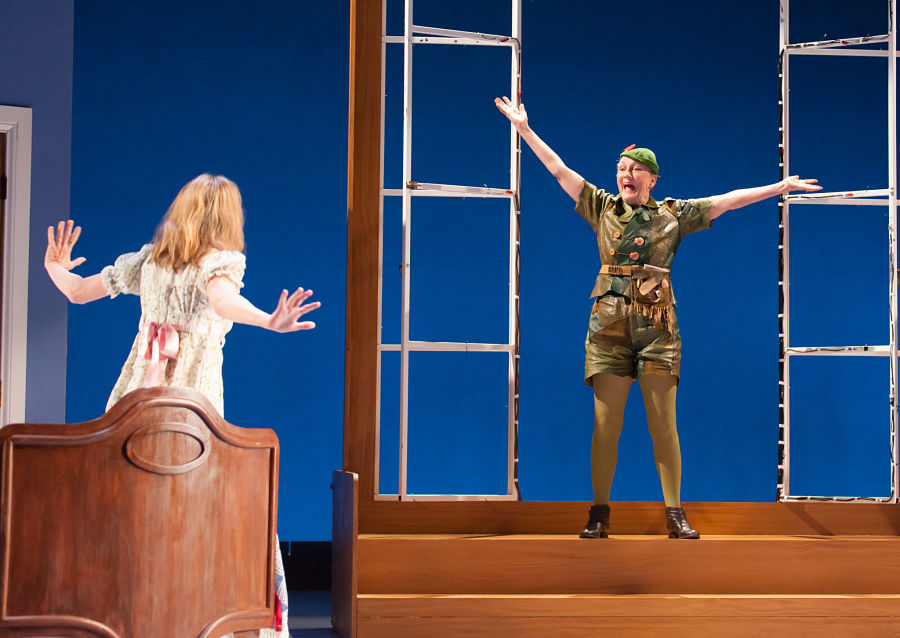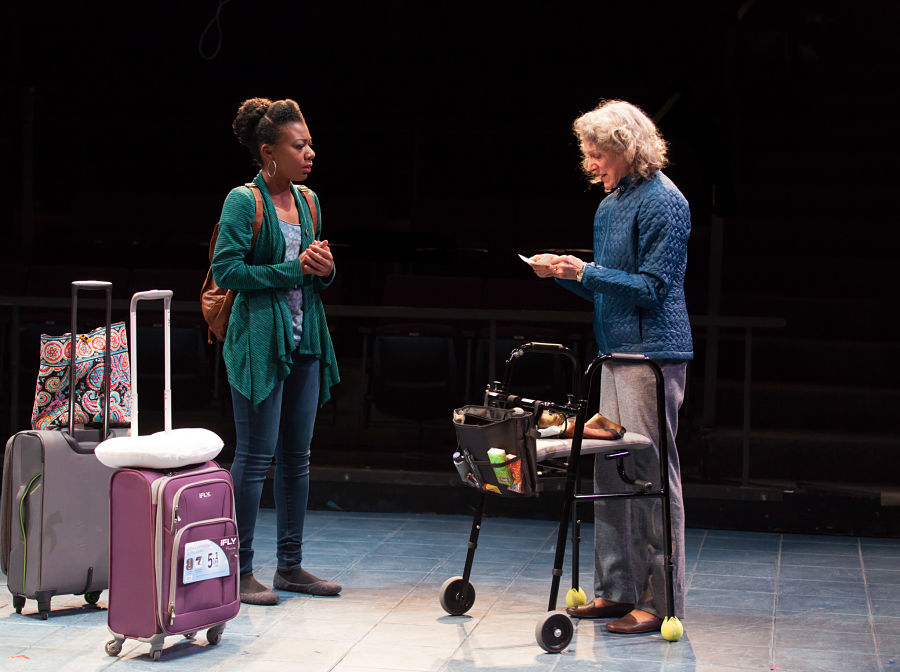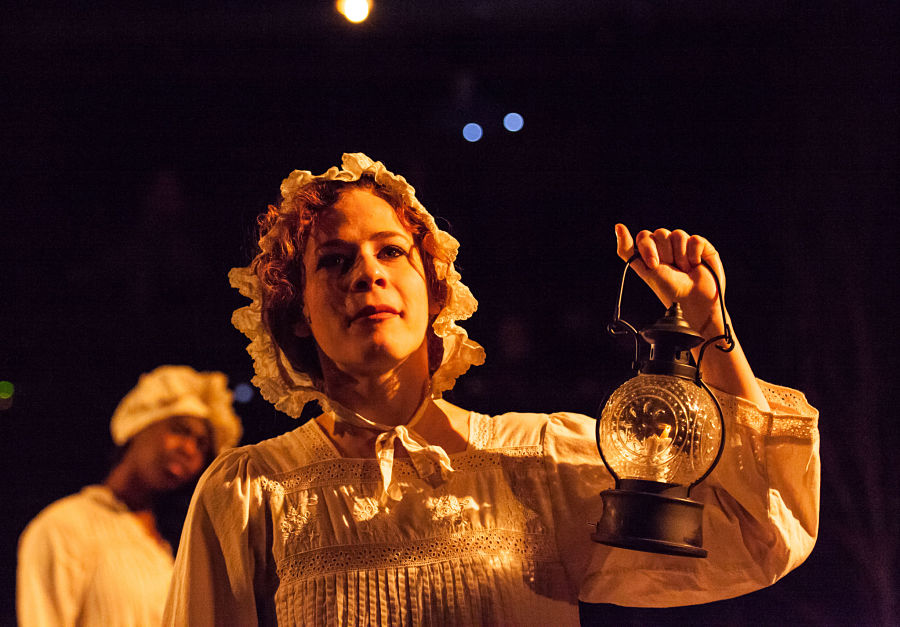LOUISVILLE, KY.: Kentucky is the land of bourbon, bluegrass, and brunches. Louisville, the state’s most populous city, is known for making many things: It’s the home of businesses such as the Yum! brand (Taco Bell, Pizza Hut, KFC), Long John Silver’s, Papa John’s, Texas Roadhouse, the Louisville Slugger factory, and the health insurance company Humana. This last entity is responsible for another unique product of the city, held each spring at Actors Theatre of Louisville: the Humana Festival of New American Plays.

Many of the works in the festival this time around, which ran March 2–April 10, treated ideas of death and mortality, which fit under larger thematic umbrellas of transition and family. Even the murder of children and parents takes place or is discussed in a number of the pieces. Among the works in this spring’s Humana, the company’s 40th, were Laura Jacqmin’s Residence, which follows the stories of a mother returning to work on the road after suffering from postpartum depression, a hotel management trainee who zealously pursues promotion to manager, and a front desk clerk struggling to sort out his life; Sarah Ruhl’s For Peter Pan on her 70th birthday, which confronts the many emotions involved in losing a parent and in growing up (and older); Steven Dietz’s This Random World, an intricately interwoven play about missed connections that touches upon death with humor and tenderness; Brendan Pelsue’s Wellesley Girl, in which the U.S., in the year 2465, has become “a small, walled-in citadel with little knowledge of the outside world,” with a prominent character whose policies distinctly echo a certain business-mogul presidential candidate; Hansol Jung’s Cardboard Piano, the story of an interracial couple in Northern Uganda in which the two young women face the violence of civil war; and Martyna Majok, Meg Miroshnik, Jiehae Park, and Jen Silverman’s Wondrous Strange, comprised of nine crosscutting playlets related to ghosts, including a memorable sendup of bro culture, Silverman’s “Ghost Bros.” (Ghosts are hardly new to Actors Theatre; last year’s I Will Be Gone by Erin Courtney had a spectral aspect, and I’m told of ghost sightings at the theatre.)
Change is prominent in all of these pieces, though of course change is the common currency of any drama worth its salt. But the plays’ emphasis on shifting times and among generations and eras parallels a period of transition for Actors Theatre. Artistic director Les Waters is only a handful of years into his tenure, having joined the theatre in early 2012 as its third leader, following a.d. Marc Masterson and founding producing director Jon Jory. Waters took the helm just a few years after Louisville launched a campaign to rechristen itself Possibility City, and Waters has embodied this moniker through his investment in creating new opportunities at Actors Theatre, programming deeper-diving and more layered works. Now in his third year of fully overseeing curation of Humana, Waters’s commissions have begun rolling out, including the centerpiece of this year’s festival: Ruhl’s For Peter Pan, also directed by Waters.

That play, which will be the focus of a future Production Notebook, is especially poignant in its treatment of time and transition, depicting the ways a family processes the death of their father and grapples with aging. Even the cast’s flying training by Louisville-based flying-effects company ZFX, which provided original aerial choreography for the obligatory Neverland sequence, was underscored by the passage of time. “What you can do when you’re 20,” explained Waters in an interview in his office during the festival, “is not so easy to do when you’re 60.”
Fully half of Humana 2016’s mainstage productions contained ghostly apparitions of one kind or another, including For Peter Pan. Waters stressed that this motif was a happy accident. “We don’t program thematically,” he insisted. “We program with a responsibility to diversity and different voices, and then the connections start to appear to other people.”
Still, the prompt for Wondrous Strange, written for Actors Theatre’s company of apprentice performers, was ghost stories. That choice came out of Waters’s enthusiasm for reinforcing a sense of place in the theatre: One 2015 commission, Charles Mee’s The Glory of the World, examined the many sides of Kentuckian and Catholic monk Thomas Merton, and that year’s apprentice show concentrated on bluegrass. This year, the local link was provided by For Peter Pan, which featured area high school marching bands not specified in the script. As for Wondrous Strange, its location is pegged in the program as “Kentucky and beyond,” and Waters noted the region’s connection to tales of apparations. “The city has a very rich history of ghost stories, the state does,” he said. “All of us could at one point say we’re haunted. But it’s not a deliberate theme.”
Indeed, though there may have been plenty of specters onstage for Humana 2016, Waters doesn’t seem haunted by previous leaders of the organization. Quite the contrary, he seems to thrive on change, and one adjustment, according to associate artistic director Meredith McDonough, has proven particularly fruitful. When Waters came in, Actors Theatre reduced Humana’s mainstage slate from seven shows to six, and the shift has allowed for a more relaxed production schedule. McDonough said that the two extra days have made the experience far more fulfilling for the writers, who use the additional time to make further tweaks.
The forward movement typified by Waters’s leadership was mirrored by works in this year’s festival, including For Peter Pan and This Random World. McDonough directed the Dietz play, in a staging that built on the momentum of the piece by costuming the apprentice company, which doubles as the stage crew, and having them in character during scene changes. These choices amplified the festival’s pervasive feeling of motion and transition.

That emphasis on forward motion extends to the plays Waters selects. A member of his staff mentioned casually that Waters has a knack for selecting plays that will be considered canonical down the line. For what it’s worth, half of the writers in this year’s festival have appeared in our magazine’s Role Call feature, a coincidence that speaks to Waters’s dedication to representing diverse new voices.
“I’m proud of the fact that we’re not scared of super-emerging writers if the stories that they are telling are really compelling,” McDonough said, pointing out that in the four festivals since she and Waters joined the team full time, each Humana has incorporated at least one playwright in school or just recently graduated; she feels that the range of ages makes for greater variety in how stories are told. A number of this year’s pieces, such as Wellesley Girl and Carboard Piano, she observed, delve into a big idea, whereas Ruhl says, in McDonough’s words, “No, I’m going to embrace all the best parts of theatricality.” This Random World is episodic, McDonough commented, “but in a way that’s deeply of the theatre” in its rhythm and language. Showcasing works by newcomers as well as seasoned playwrights, McDonough said, fosters conversations between the generations of writers.
Waters suggested that we’re undergoing a time of shift and transition as a society, thanks in part to the developing role of mobile technology. “I think we’re in the middle of something changing so extraordinarily fast, how we relate to the world,” he said. “There may be some basic, democratic need in people that you need to sit in a space with a bunch of people you’ve never ever met and experience something happening in front of you. I think 20-year-olds want that as much as people who’ve been doing it all their life.”
Change itself is a key component of Waters’s process in programming Humana.
“If I read something and think, ‘That’s terrifying. How would that happen?’ or I’m not even sure it’s a play, then I would walk toward it to see what it is,” he said. “On a directing level, I’m interested to see who I’ll be at the end of the process, ’cause the things have to change you.”


